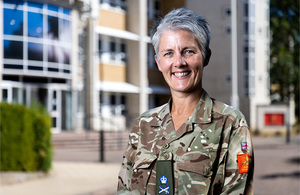The Coast to Coast route stretching from St Bees in Cumbria to Robin Hoods Bay in the North York Moors National Park will become a new National Trail, it was announced today (Friday 12 August).
Natural England will work alongside partners to improve the popular route, with £5.6 million committed to upgrade the 197-mile path. This includes funding set aside to develop a community engagement programme, and maximise economic and health benefits for local people and businesses.
Today’s announcement, which delivers on a Government commitment to develop the route, will also ensure long-term support for the National Trail.
There are significant benefits to the Coast to Coast becoming a part of the internationally recognised National Trails family, including meeting the National Trail Quality Standards with investment to ensure:
- The path is made more accessible for people of different abilities. This could include measures to remove stiles and using accessible gates where possible
- High quality signage, waymarking, path surfaces and infrastructure are provided consistently across the whole route
- Circular paths and link routes are developed to make the trail more accessible for those interested in taking shorter walks
- The route is well promoted including being featured on the Visit Britain and National Trail’s website to create new opportunities for international and domestic tourism
- Work with local businesses to ensure they are aware of the potential economic opportunities of the route
- A long term commitment to funding to help the local authorities maintain the path
Natural England will work alongside the Lake District, North York Moors and Yorkshire Dales National Parks as well as Cumbria and North Yorkshire County Councils to improve the path. Enhancements will be undertaken over three years with the upgraded path expected to open in 2025. It is intended that the new National Trail will closely follow the existing route.
Lord Benyon, Minister for Rural Affairs, said:
The Coast to Coast route passes through some of our most spectacular countryside, villages and natural habitats so I’m delighted to approve these plans and deliver on our manifesto commitment to develop the route into a new National Trail.
With over £5 million of new funding to upgrade the path, local business and communities will be able to secure real benefits from the sustainable tourism this route offers. I look forward to seeing the route go from strength to strength and leave a lasting legacy across the North of England.
Marian Spain, Chief Executive of Natural England, said:
The way we will now develop the Coast to Coast into a National Trail is a turning point for national trail development as it will be the first national trail where delivery of the social and economic benefits for users and communities will be built in from the start.
Once established the Coast to Coast National Trail will allow many different types of users, with a range of abilities and backgrounds, to connect with nature on this iconic walking route whilst also bringing the benefits of tourism and other business to communities along the trail.
Those who live nearby but may not currently access the countryside on their doorsteps will also have the chance to use the Trail for local and longer circular walks. Natural England looks forward to working hard with our partners to make this vision a reality within the next 3 years.
With seven towns within 5 km of the route: Cleator Moor, Egremont, Kirkby Stephen, Northallerton, Richmond, Whitby and Whitehaven, as well as seaside fishing villages, investment in the path will promote levelling up through improved health, wellbeing and public access opportunities for local communities close by.
A programme of work to boost the economic and social benefits for local areas will help ensure local businesses are aware of new opportunities from further developing tour guiding services, to improved accommodation and hospitality.
Natural England will also work with local communities and local authorities boost access to nature for all abilities. This will include working with disabled user groups and developing circular paths: to make more of the route accessible for shorter day or part-day circular walks/ rides, these could start in towns and villages or car parks, shops or pubs.
Julia Bradbury said:
I’m so pleased that this well-trodden route is to become an official national trail.
Having walked the walk (and talked the talk!), and promoted its virtues on TV and in print, I know exactly why it is one of the great Alfred Wainwright’s most popular routes. Taking in the magical Lake District, to the heights of the peaks and the rolling landscapes of the Yorkshire Dales and Moors – it is just stunning.
Through our website – The Outdoor Guide – we are passionate about encouraging more people to explore our countryside, connecting body with mind and feeling the benefits of nature. I hope that this improved path and more local routes will inspire everyone to get walking and enjoy it in all its glory!
Eric Robson OBE DL, Chairman, The Wainwright Society:
The designation of Wainwright’s Coast to Coast Walk as a National Trail has long been one of the Society’s ambitions. The Walk is one of the country’s most popular long-distance routes, and helps support businesses and jobs from St Bees to Robin Hood’s Bay, including in some of the north’s most sparsely populated rural communities. We very much welcome, therefore, the news that the route will become a new National Trail. This is the start, of course, of bringing the project to successful fruition. But this is a very exciting and important step and we look forward to working with partners along the route to establish the C2C Walk as one of the UK’s great National Trails. As Alfred Wainwright said of the walk he devised: “Surely there cannot be a finer itinerary for a long-distance walk!
The upgrade to National Trail status will see the route recorded on Ordnance Survey maps in its entirety for the first time. The route was first devised by Alfred Wainwright, a renowned fell walker and author, with his guidebook to the route published in 1973. The route immediately gained a strong following, becoming one of the UK’s most popular long-distance walks.
Today, the long-distance route noted by Wainwright for its scenic beauty passes through the Lake District, Yorkshire Dales and the North York Moors crossing through three National Parks and the North Pennines Area of Outstanding Natural Beauty. The path remains popular with walkers and international tourists and is currently walked in its entirety by around 6,000 people every year, generating approximately £7 million for the local economy, despite its unofficial status.
On the Coast to Coast path walkers can traverse through high fells, heather moorland and heath. The route also encompasses some of England’s richest history – from iron age hillforts to medieval castles and the village of Ingleby Cross, which is thought to date back to the 10th century.
Natural England has worked closely with the Lake District, Yorkshire Dales and North York Moors National Park authorities and Cumbria and North Yorkshire County Councils to develop proposals and secure approval for the National Trail.
Natural England and partners will begin to engage with local communities as work begins on the path. It is estimated that work will be completed by 2025.
Natural England proposed the trail under section 51 of the National Parks and Access to the Countryside Act 1949 and approval is made on behalf of the Environment Secretary under section 52 of the Act.
While 85% of the existing route is a public right of way or on land with existing legal access rights there are some locations where changes to the existing rights of way or new paths are needed to ensure the long-term sustainability of the trail. Natural England will now begin to discuss the proposals to create:
- 9.7 miles of new public footpath
- 9 miles of new public bridleway
- 5 miles of realignment of existing rights of way


